BSc Business Management: Motivation & Strategies for Negativity
VerifiedAdded on 2023/06/18
|7
|1963
|265
Report
AI Summary
This report provides a detailed analysis of employee motivation within an organizational context, highlighting the significance of psychological factors such as financial desire, success, and job satisfaction in achieving organizational goals. It explores various motivational theories, including Maslow's hierarchy of needs, and differentiates between intrinsic and extrinsic motivation. The report identifies key factors that motivate employees, such as salary, promotion opportunities, and a positive work environment, while also addressing negative factors like low wages, poor management, partiality, and lack of benefits. Furthermore, it suggests strategies to cope with these negative factors, emphasizing the importance of fair wages, proper benefits, equitable policies, and a healthy work environment. The conclusion underscores the role of motivation in enhancing business performance and building a positive reputation, encouraging organizations to prioritize employee motivation for long-term success. Desklib provides similar solved assignments and past papers for students.
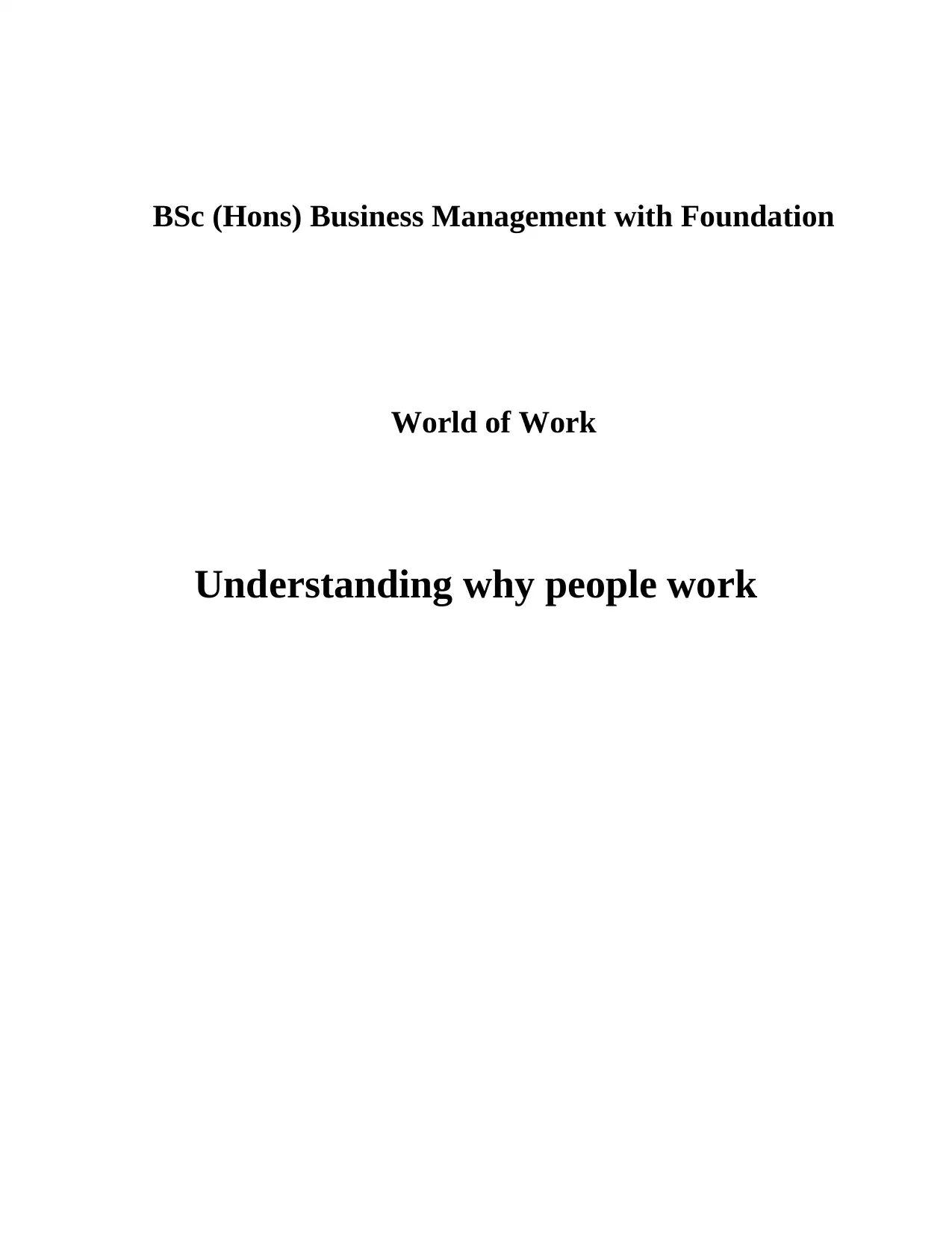
BSc (Hons) Business Management with Foundation
World of Work
Understanding why people work
World of Work
Understanding why people work
Paraphrase This Document
Need a fresh take? Get an instant paraphrase of this document with our AI Paraphraser
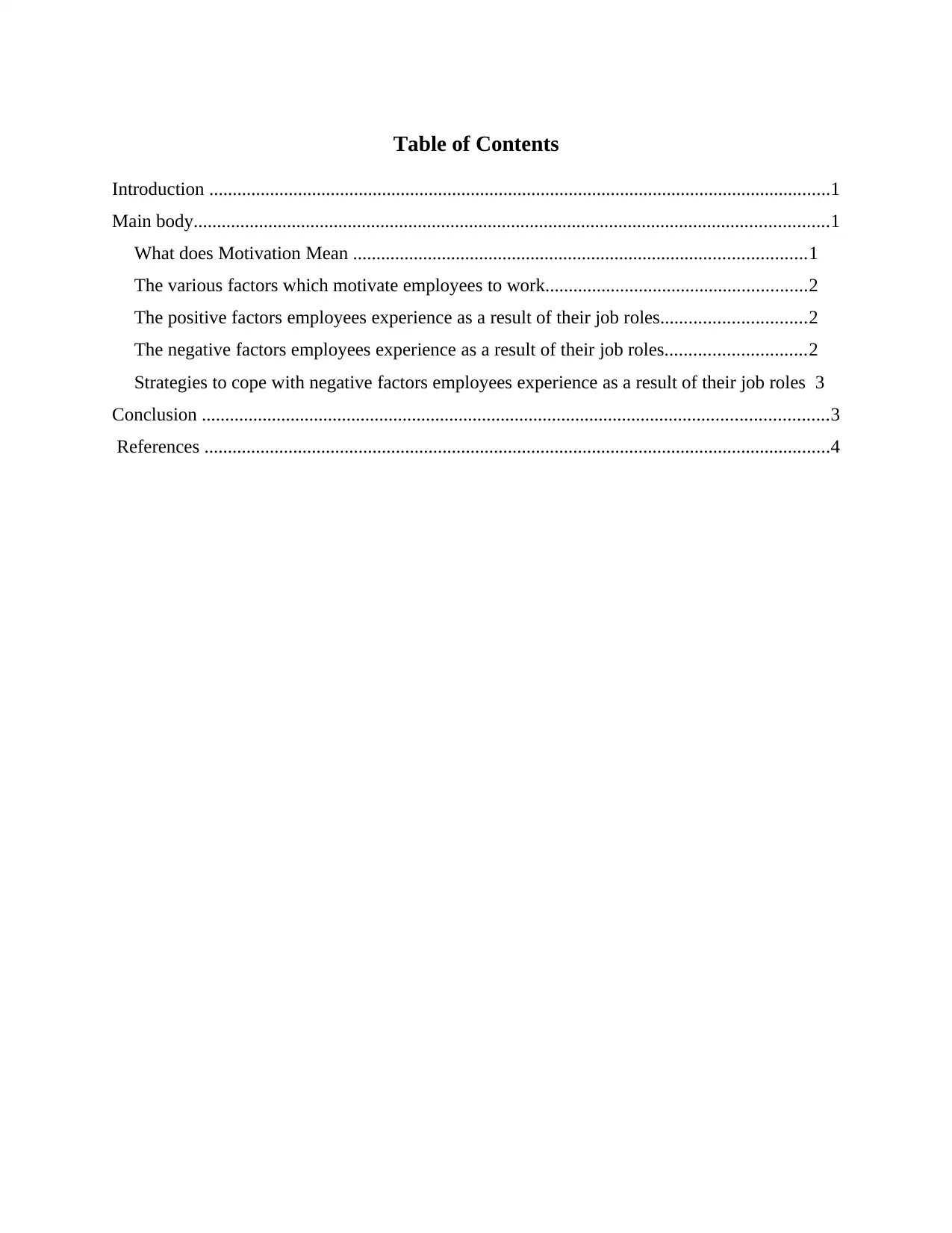
Table of Contents
Introduction .....................................................................................................................................1
Main body........................................................................................................................................1
What does Motivation Mean .................................................................................................1
The various factors which motivate employees to work........................................................2
The positive factors employees experience as a result of their job roles...............................2
The negative factors employees experience as a result of their job roles..............................2
Strategies to cope with negative factors employees experience as a result of their job roles 3
Conclusion ......................................................................................................................................3
References ......................................................................................................................................4
Introduction .....................................................................................................................................1
Main body........................................................................................................................................1
What does Motivation Mean .................................................................................................1
The various factors which motivate employees to work........................................................2
The positive factors employees experience as a result of their job roles...............................2
The negative factors employees experience as a result of their job roles..............................2
Strategies to cope with negative factors employees experience as a result of their job roles 3
Conclusion ......................................................................................................................................3
References ......................................................................................................................................4
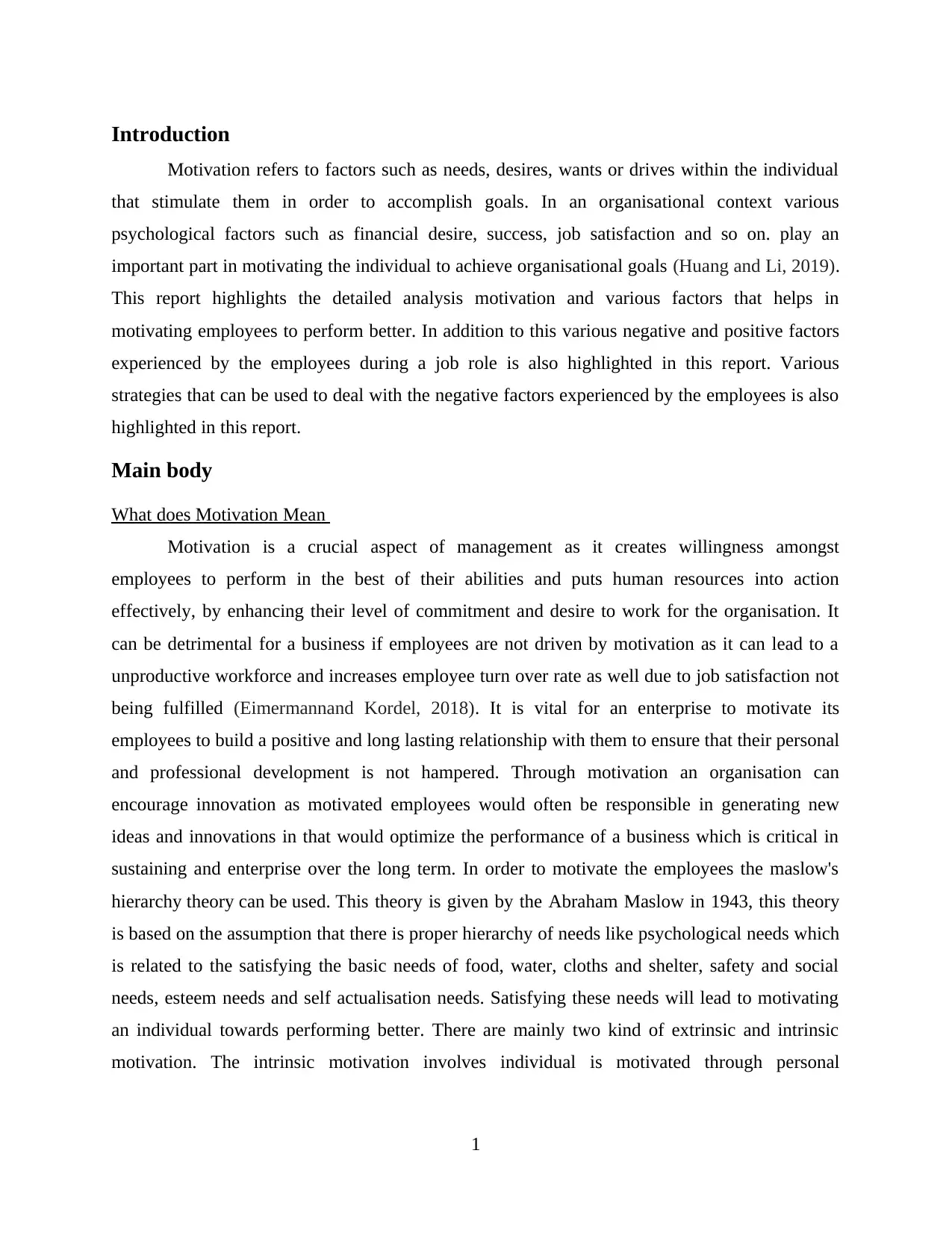
Introduction
Motivation refers to factors such as needs, desires, wants or drives within the individual
that stimulate them in order to accomplish goals. In an organisational context various
psychological factors such as financial desire, success, job satisfaction and so on. play an
important part in motivating the individual to achieve organisational goals (Huang and Li, 2019).
This report highlights the detailed analysis motivation and various factors that helps in
motivating employees to perform better. In addition to this various negative and positive factors
experienced by the employees during a job role is also highlighted in this report. Various
strategies that can be used to deal with the negative factors experienced by the employees is also
highlighted in this report.
Main body
What does Motivation Mean
Motivation is a crucial aspect of management as it creates willingness amongst
employees to perform in the best of their abilities and puts human resources into action
effectively, by enhancing their level of commitment and desire to work for the organisation. It
can be detrimental for a business if employees are not driven by motivation as it can lead to a
unproductive workforce and increases employee turn over rate as well due to job satisfaction not
being fulfilled (Eimermannand Kordel, 2018). It is vital for an enterprise to motivate its
employees to build a positive and long lasting relationship with them to ensure that their personal
and professional development is not hampered. Through motivation an organisation can
encourage innovation as motivated employees would often be responsible in generating new
ideas and innovations in that would optimize the performance of a business which is critical in
sustaining and enterprise over the long term. In order to motivate the employees the maslow's
hierarchy theory can be used. This theory is given by the Abraham Maslow in 1943, this theory
is based on the assumption that there is proper hierarchy of needs like psychological needs which
is related to the satisfying the basic needs of food, water, cloths and shelter, safety and social
needs, esteem needs and self actualisation needs. Satisfying these needs will lead to motivating
an individual towards performing better. There are mainly two kind of extrinsic and intrinsic
motivation. The intrinsic motivation involves individual is motivated through personal
1
Motivation refers to factors such as needs, desires, wants or drives within the individual
that stimulate them in order to accomplish goals. In an organisational context various
psychological factors such as financial desire, success, job satisfaction and so on. play an
important part in motivating the individual to achieve organisational goals (Huang and Li, 2019).
This report highlights the detailed analysis motivation and various factors that helps in
motivating employees to perform better. In addition to this various negative and positive factors
experienced by the employees during a job role is also highlighted in this report. Various
strategies that can be used to deal with the negative factors experienced by the employees is also
highlighted in this report.
Main body
What does Motivation Mean
Motivation is a crucial aspect of management as it creates willingness amongst
employees to perform in the best of their abilities and puts human resources into action
effectively, by enhancing their level of commitment and desire to work for the organisation. It
can be detrimental for a business if employees are not driven by motivation as it can lead to a
unproductive workforce and increases employee turn over rate as well due to job satisfaction not
being fulfilled (Eimermannand Kordel, 2018). It is vital for an enterprise to motivate its
employees to build a positive and long lasting relationship with them to ensure that their personal
and professional development is not hampered. Through motivation an organisation can
encourage innovation as motivated employees would often be responsible in generating new
ideas and innovations in that would optimize the performance of a business which is critical in
sustaining and enterprise over the long term. In order to motivate the employees the maslow's
hierarchy theory can be used. This theory is given by the Abraham Maslow in 1943, this theory
is based on the assumption that there is proper hierarchy of needs like psychological needs which
is related to the satisfying the basic needs of food, water, cloths and shelter, safety and social
needs, esteem needs and self actualisation needs. Satisfying these needs will lead to motivating
an individual towards performing better. There are mainly two kind of extrinsic and intrinsic
motivation. The intrinsic motivation involves individual is motivated through personal
1
⊘ This is a preview!⊘
Do you want full access?
Subscribe today to unlock all pages.

Trusted by 1+ million students worldwide
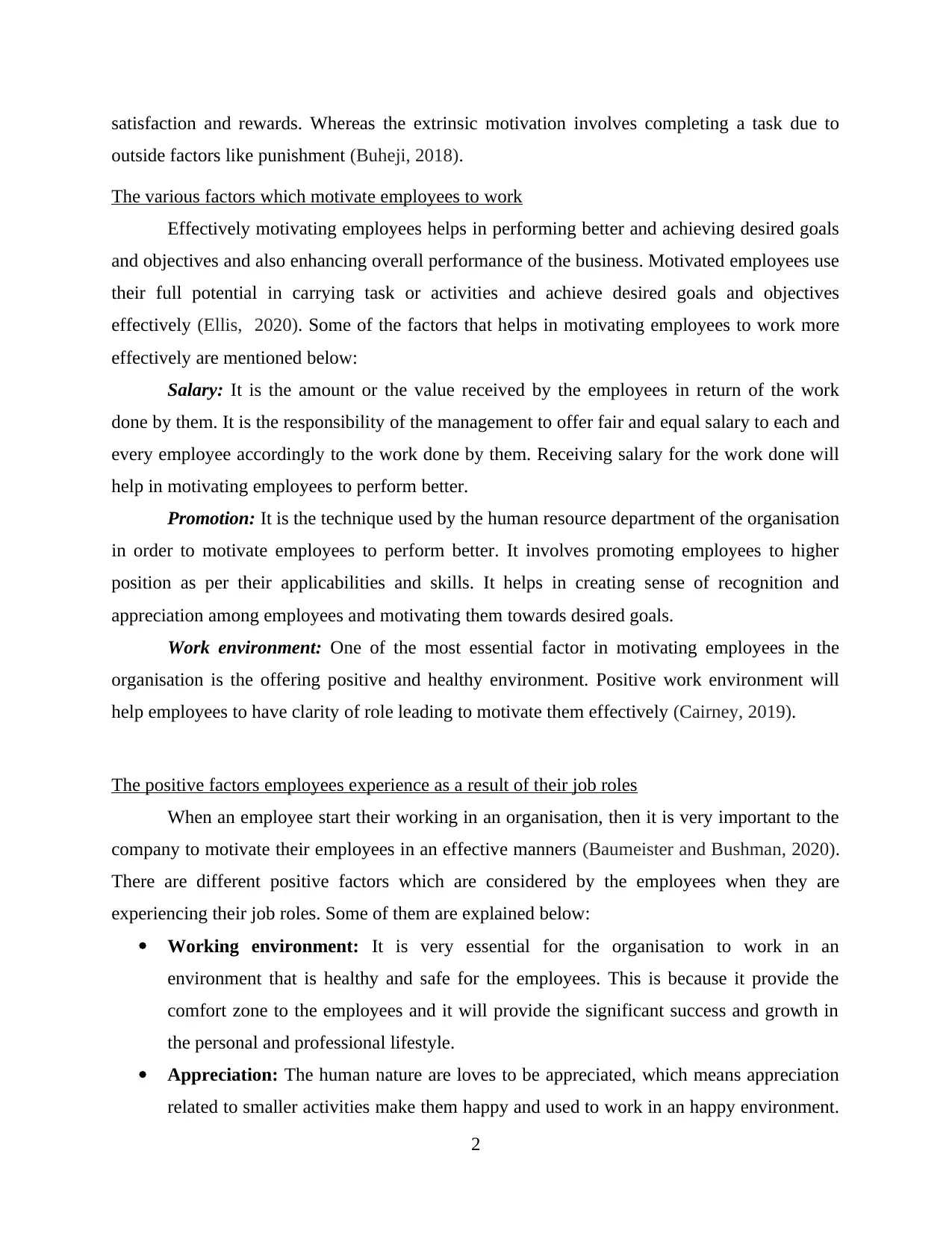
satisfaction and rewards. Whereas the extrinsic motivation involves completing a task due to
outside factors like punishment (Buheji, 2018).
The various factors which motivate employees to work
Effectively motivating employees helps in performing better and achieving desired goals
and objectives and also enhancing overall performance of the business. Motivated employees use
their full potential in carrying task or activities and achieve desired goals and objectives
effectively (Ellis, 2020). Some of the factors that helps in motivating employees to work more
effectively are mentioned below:
Salary: It is the amount or the value received by the employees in return of the work
done by them. It is the responsibility of the management to offer fair and equal salary to each and
every employee accordingly to the work done by them. Receiving salary for the work done will
help in motivating employees to perform better.
Promotion: It is the technique used by the human resource department of the organisation
in order to motivate employees to perform better. It involves promoting employees to higher
position as per their applicabilities and skills. It helps in creating sense of recognition and
appreciation among employees and motivating them towards desired goals.
Work environment: One of the most essential factor in motivating employees in the
organisation is the offering positive and healthy environment. Positive work environment will
help employees to have clarity of role leading to motivate them effectively (Cairney, 2019).
The positive factors employees experience as a result of their job roles
When an employee start their working in an organisation, then it is very important to the
company to motivate their employees in an effective manners (Baumeister and Bushman, 2020).
There are different positive factors which are considered by the employees when they are
experiencing their job roles. Some of them are explained below:
Working environment: It is very essential for the organisation to work in an
environment that is healthy and safe for the employees. This is because it provide the
comfort zone to the employees and it will provide the significant success and growth in
the personal and professional lifestyle.
Appreciation: The human nature are loves to be appreciated, which means appreciation
related to smaller activities make them happy and used to work in an happy environment.
2
outside factors like punishment (Buheji, 2018).
The various factors which motivate employees to work
Effectively motivating employees helps in performing better and achieving desired goals
and objectives and also enhancing overall performance of the business. Motivated employees use
their full potential in carrying task or activities and achieve desired goals and objectives
effectively (Ellis, 2020). Some of the factors that helps in motivating employees to work more
effectively are mentioned below:
Salary: It is the amount or the value received by the employees in return of the work
done by them. It is the responsibility of the management to offer fair and equal salary to each and
every employee accordingly to the work done by them. Receiving salary for the work done will
help in motivating employees to perform better.
Promotion: It is the technique used by the human resource department of the organisation
in order to motivate employees to perform better. It involves promoting employees to higher
position as per their applicabilities and skills. It helps in creating sense of recognition and
appreciation among employees and motivating them towards desired goals.
Work environment: One of the most essential factor in motivating employees in the
organisation is the offering positive and healthy environment. Positive work environment will
help employees to have clarity of role leading to motivate them effectively (Cairney, 2019).
The positive factors employees experience as a result of their job roles
When an employee start their working in an organisation, then it is very important to the
company to motivate their employees in an effective manners (Baumeister and Bushman, 2020).
There are different positive factors which are considered by the employees when they are
experiencing their job roles. Some of them are explained below:
Working environment: It is very essential for the organisation to work in an
environment that is healthy and safe for the employees. This is because it provide the
comfort zone to the employees and it will provide the significant success and growth in
the personal and professional lifestyle.
Appreciation: The human nature are loves to be appreciated, which means appreciation
related to smaller activities make them happy and used to work in an happy environment.
2
Paraphrase This Document
Need a fresh take? Get an instant paraphrase of this document with our AI Paraphraser
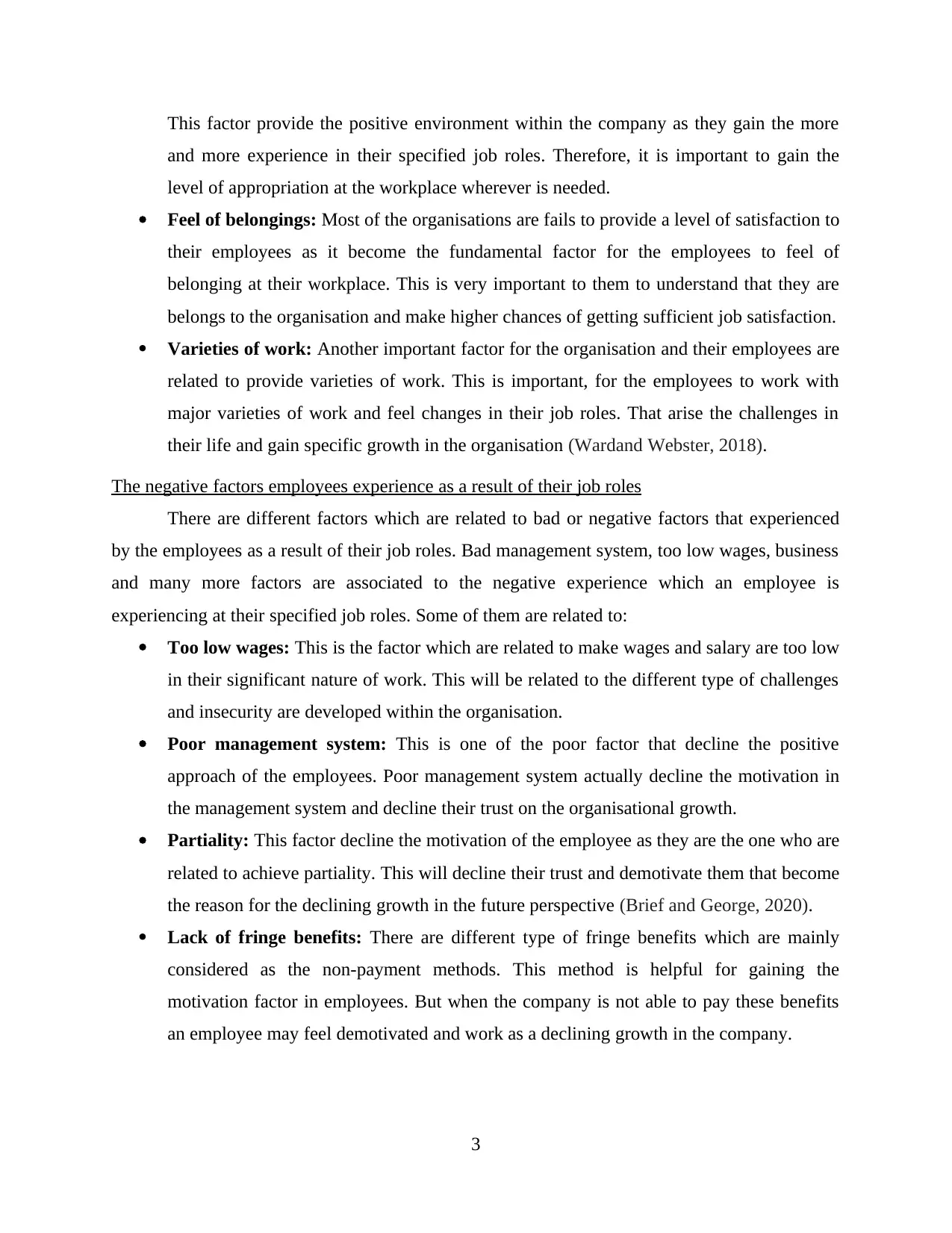
This factor provide the positive environment within the company as they gain the more
and more experience in their specified job roles. Therefore, it is important to gain the
level of appropriation at the workplace wherever is needed.
Feel of belongings: Most of the organisations are fails to provide a level of satisfaction to
their employees as it become the fundamental factor for the employees to feel of
belonging at their workplace. This is very important to them to understand that they are
belongs to the organisation and make higher chances of getting sufficient job satisfaction.
Varieties of work: Another important factor for the organisation and their employees are
related to provide varieties of work. This is important, for the employees to work with
major varieties of work and feel changes in their job roles. That arise the challenges in
their life and gain specific growth in the organisation (Wardand Webster, 2018).
The negative factors employees experience as a result of their job roles
There are different factors which are related to bad or negative factors that experienced
by the employees as a result of their job roles. Bad management system, too low wages, business
and many more factors are associated to the negative experience which an employee is
experiencing at their specified job roles. Some of them are related to:
Too low wages: This is the factor which are related to make wages and salary are too low
in their significant nature of work. This will be related to the different type of challenges
and insecurity are developed within the organisation.
Poor management system: This is one of the poor factor that decline the positive
approach of the employees. Poor management system actually decline the motivation in
the management system and decline their trust on the organisational growth.
Partiality: This factor decline the motivation of the employee as they are the one who are
related to achieve partiality. This will decline their trust and demotivate them that become
the reason for the declining growth in the future perspective (Brief and George, 2020).
Lack of fringe benefits: There are different type of fringe benefits which are mainly
considered as the non-payment methods. This method is helpful for gaining the
motivation factor in employees. But when the company is not able to pay these benefits
an employee may feel demotivated and work as a declining growth in the company.
3
and more experience in their specified job roles. Therefore, it is important to gain the
level of appropriation at the workplace wherever is needed.
Feel of belongings: Most of the organisations are fails to provide a level of satisfaction to
their employees as it become the fundamental factor for the employees to feel of
belonging at their workplace. This is very important to them to understand that they are
belongs to the organisation and make higher chances of getting sufficient job satisfaction.
Varieties of work: Another important factor for the organisation and their employees are
related to provide varieties of work. This is important, for the employees to work with
major varieties of work and feel changes in their job roles. That arise the challenges in
their life and gain specific growth in the organisation (Wardand Webster, 2018).
The negative factors employees experience as a result of their job roles
There are different factors which are related to bad or negative factors that experienced
by the employees as a result of their job roles. Bad management system, too low wages, business
and many more factors are associated to the negative experience which an employee is
experiencing at their specified job roles. Some of them are related to:
Too low wages: This is the factor which are related to make wages and salary are too low
in their significant nature of work. This will be related to the different type of challenges
and insecurity are developed within the organisation.
Poor management system: This is one of the poor factor that decline the positive
approach of the employees. Poor management system actually decline the motivation in
the management system and decline their trust on the organisational growth.
Partiality: This factor decline the motivation of the employee as they are the one who are
related to achieve partiality. This will decline their trust and demotivate them that become
the reason for the declining growth in the future perspective (Brief and George, 2020).
Lack of fringe benefits: There are different type of fringe benefits which are mainly
considered as the non-payment methods. This method is helpful for gaining the
motivation factor in employees. But when the company is not able to pay these benefits
an employee may feel demotivated and work as a declining growth in the company.
3
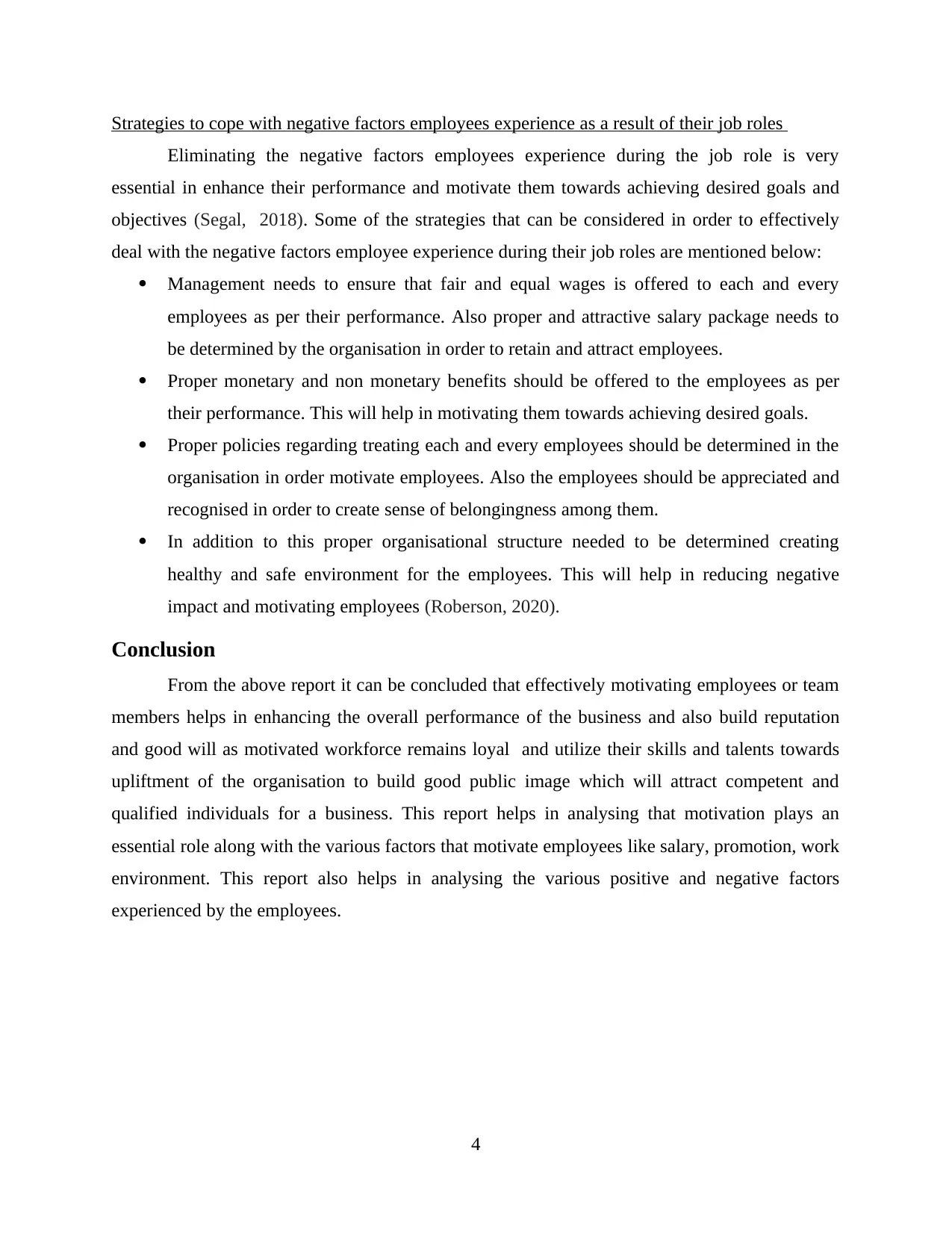
Strategies to cope with negative factors employees experience as a result of their job roles
Eliminating the negative factors employees experience during the job role is very
essential in enhance their performance and motivate them towards achieving desired goals and
objectives (Segal, 2018). Some of the strategies that can be considered in order to effectively
deal with the negative factors employee experience during their job roles are mentioned below:
Management needs to ensure that fair and equal wages is offered to each and every
employees as per their performance. Also proper and attractive salary package needs to
be determined by the organisation in order to retain and attract employees.
Proper monetary and non monetary benefits should be offered to the employees as per
their performance. This will help in motivating them towards achieving desired goals.
Proper policies regarding treating each and every employees should be determined in the
organisation in order motivate employees. Also the employees should be appreciated and
recognised in order to create sense of belongingness among them.
In addition to this proper organisational structure needed to be determined creating
healthy and safe environment for the employees. This will help in reducing negative
impact and motivating employees (Roberson, 2020).
Conclusion
From the above report it can be concluded that effectively motivating employees or team
members helps in enhancing the overall performance of the business and also build reputation
and good will as motivated workforce remains loyal and utilize their skills and talents towards
upliftment of the organisation to build good public image which will attract competent and
qualified individuals for a business. This report helps in analysing that motivation plays an
essential role along with the various factors that motivate employees like salary, promotion, work
environment. This report also helps in analysing the various positive and negative factors
experienced by the employees.
4
Eliminating the negative factors employees experience during the job role is very
essential in enhance their performance and motivate them towards achieving desired goals and
objectives (Segal, 2018). Some of the strategies that can be considered in order to effectively
deal with the negative factors employee experience during their job roles are mentioned below:
Management needs to ensure that fair and equal wages is offered to each and every
employees as per their performance. Also proper and attractive salary package needs to
be determined by the organisation in order to retain and attract employees.
Proper monetary and non monetary benefits should be offered to the employees as per
their performance. This will help in motivating them towards achieving desired goals.
Proper policies regarding treating each and every employees should be determined in the
organisation in order motivate employees. Also the employees should be appreciated and
recognised in order to create sense of belongingness among them.
In addition to this proper organisational structure needed to be determined creating
healthy and safe environment for the employees. This will help in reducing negative
impact and motivating employees (Roberson, 2020).
Conclusion
From the above report it can be concluded that effectively motivating employees or team
members helps in enhancing the overall performance of the business and also build reputation
and good will as motivated workforce remains loyal and utilize their skills and talents towards
upliftment of the organisation to build good public image which will attract competent and
qualified individuals for a business. This report helps in analysing that motivation plays an
essential role along with the various factors that motivate employees like salary, promotion, work
environment. This report also helps in analysing the various positive and negative factors
experienced by the employees.
4
⊘ This is a preview!⊘
Do you want full access?
Subscribe today to unlock all pages.

Trusted by 1+ million students worldwide
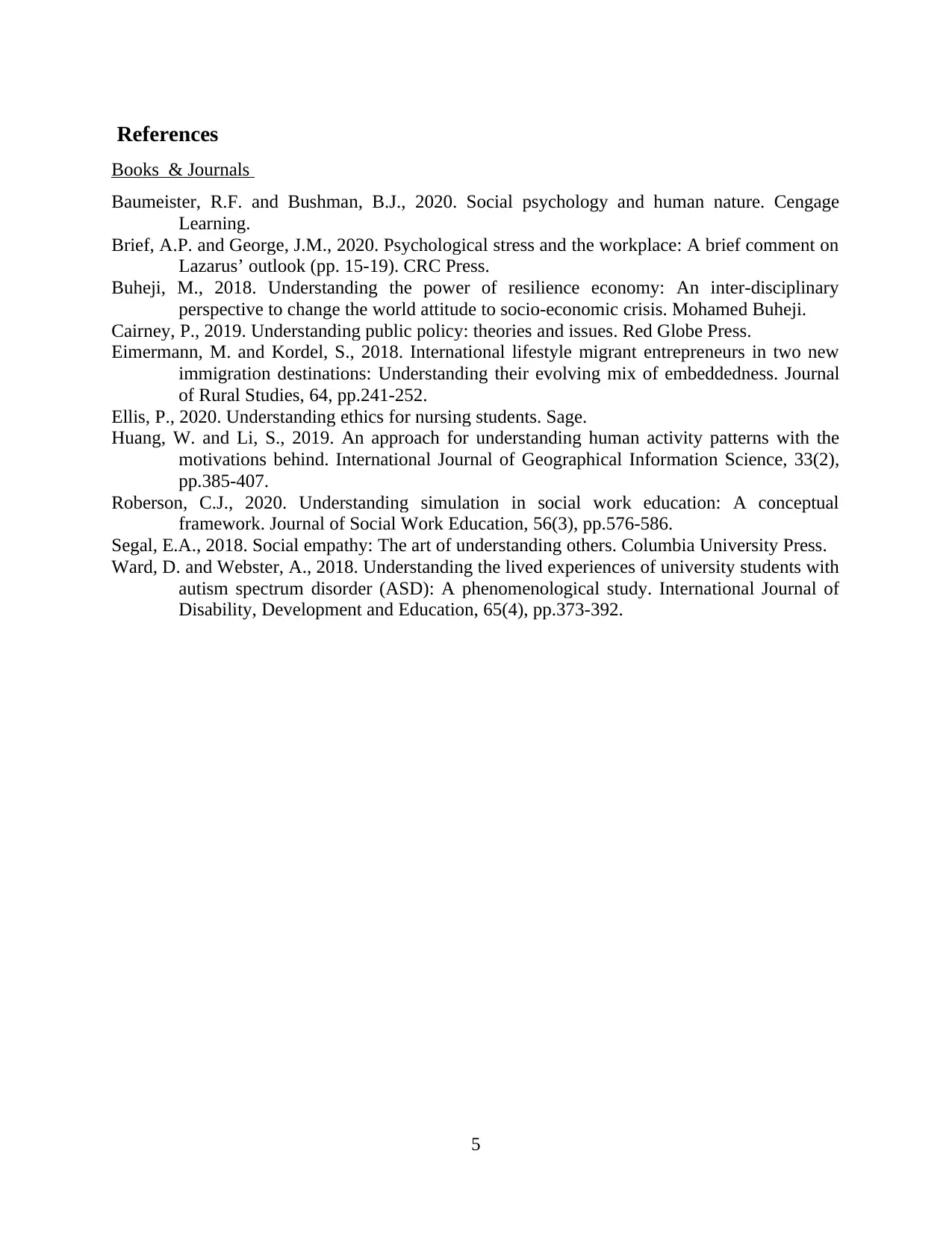
References
Books & Journals
Baumeister, R.F. and Bushman, B.J., 2020. Social psychology and human nature. Cengage
Learning.
Brief, A.P. and George, J.M., 2020. Psychological stress and the workplace: A brief comment on
Lazarus’ outlook (pp. 15-19). CRC Press.
Buheji, M., 2018. Understanding the power of resilience economy: An inter-disciplinary
perspective to change the world attitude to socio-economic crisis. Mohamed Buheji.
Cairney, P., 2019. Understanding public policy: theories and issues. Red Globe Press.
Eimermann, M. and Kordel, S., 2018. International lifestyle migrant entrepreneurs in two new
immigration destinations: Understanding their evolving mix of embeddedness. Journal
of Rural Studies, 64, pp.241-252.
Ellis, P., 2020. Understanding ethics for nursing students. Sage.
Huang, W. and Li, S., 2019. An approach for understanding human activity patterns with the
motivations behind. International Journal of Geographical Information Science, 33(2),
pp.385-407.
Roberson, C.J., 2020. Understanding simulation in social work education: A conceptual
framework. Journal of Social Work Education, 56(3), pp.576-586.
Segal, E.A., 2018. Social empathy: The art of understanding others. Columbia University Press.
Ward, D. and Webster, A., 2018. Understanding the lived experiences of university students with
autism spectrum disorder (ASD): A phenomenological study. International Journal of
Disability, Development and Education, 65(4), pp.373-392.
5
Books & Journals
Baumeister, R.F. and Bushman, B.J., 2020. Social psychology and human nature. Cengage
Learning.
Brief, A.P. and George, J.M., 2020. Psychological stress and the workplace: A brief comment on
Lazarus’ outlook (pp. 15-19). CRC Press.
Buheji, M., 2018. Understanding the power of resilience economy: An inter-disciplinary
perspective to change the world attitude to socio-economic crisis. Mohamed Buheji.
Cairney, P., 2019. Understanding public policy: theories and issues. Red Globe Press.
Eimermann, M. and Kordel, S., 2018. International lifestyle migrant entrepreneurs in two new
immigration destinations: Understanding their evolving mix of embeddedness. Journal
of Rural Studies, 64, pp.241-252.
Ellis, P., 2020. Understanding ethics for nursing students. Sage.
Huang, W. and Li, S., 2019. An approach for understanding human activity patterns with the
motivations behind. International Journal of Geographical Information Science, 33(2),
pp.385-407.
Roberson, C.J., 2020. Understanding simulation in social work education: A conceptual
framework. Journal of Social Work Education, 56(3), pp.576-586.
Segal, E.A., 2018. Social empathy: The art of understanding others. Columbia University Press.
Ward, D. and Webster, A., 2018. Understanding the lived experiences of university students with
autism spectrum disorder (ASD): A phenomenological study. International Journal of
Disability, Development and Education, 65(4), pp.373-392.
5
1 out of 7
Related Documents
Your All-in-One AI-Powered Toolkit for Academic Success.
+13062052269
info@desklib.com
Available 24*7 on WhatsApp / Email
![[object Object]](/_next/static/media/star-bottom.7253800d.svg)
Unlock your academic potential
Copyright © 2020–2025 A2Z Services. All Rights Reserved. Developed and managed by ZUCOL.


